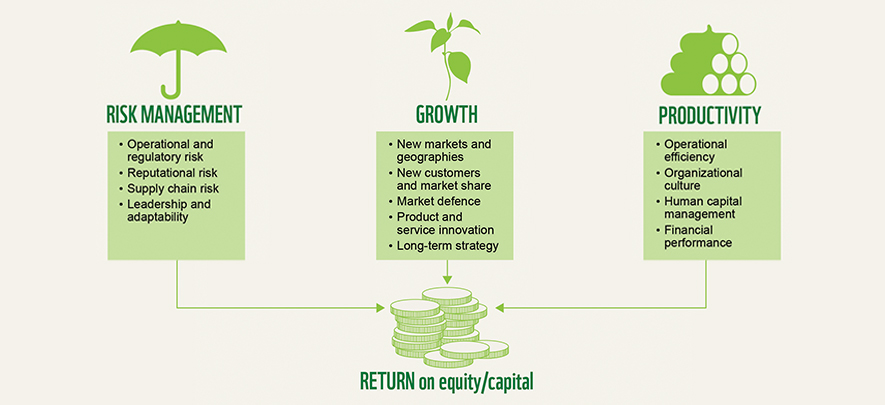Making a business case for sourcing of sustainable products

Retail
371 week ago — 9 min read
Sustainability today means a lot more than just corporate social responsibility and operational efficiency. When adopted as a comprehensive business strategy it can have multiple benefits for companies. Focusing on forest based retail products and utilities, like wood-based furniture, office supplies, tissues and sanitary products, packaging and paper-based products etc., a recent global study by WWF found that retailers with responsible sourcing policies reported tangible business benefits on numerous fronts. The survey covered a wide range of markets, including North America, Western Europe and emerging markets in Asia and Africa. A total of 54 responses from 21 sectors and 20 countries were collected.
The study found that, for retailers, the business case for sustainability generally links to value drivers in three domains: mitigating risks, growing the business, and improving productivity. Within each domain, there are numerous metrics that in theory can affect a business’ return over the medium to long term.
In the survey, the productivity matrix yielded a mixed response. For large retailers that manage numerous complex supply chains, the main drivers of productivity come from supply chain efficiency and human resource management. Our survey found that responsible sourcing could have modest negative impacts on operational costs. This is largely attributed to the lack of metrics to track efficiency and productivity, making it difficult to analyse clear benefits on efficiency. However, the cost involved was not significant enough to affect the business’ bottom line. By contrast, the majority of companies saw sustainability commitments as having a positive impact on employee engagement, indicating potential gains from higher employee satisfaction and retention.
1. Operational efficiency and Cost savings
Contrary to research by PricewaterhouseCoopers, which found sustainable supply chain initiatives contributing to cost reductions, this research did not find evidence of cost savings or efficiency gains through responsible sourcing. In fact, the majority of survey respondents reported higher costs as a result of investment in expertise, training, changing systems and other human resource costs. This can be a substantial upfront expense, and is by far the largest cost incurred by retailers in pursuing responsible sourcing. One company estimated that the cost of administering its responsible sourcing activities – including software development, human resources, NGO partnerships and travel – was around US$1.5 million. It also cited potential additional ad hoc costs of up to US$100,000 in consulting or other projects. Because the mass-market retailers interviewed are operating in a highly competitive, low-margin environment, they generally did not pay a price premium for certified products, with some exceptions. Most stated that unless a certified product can compete on price it will not sell. There are a few product categories where premiums of up to 10-15 per cent were paid to suppliers, including indoor and outdoor furniture.
Interestingly though, despite the expenses, the retailers that were surveyed generally viewed these operational elements to be neutral or only moderate costs to their business. Large retailers have found ways to off-set the costs, including system automation, consolidation of supply chains, and lower transaction costs through stronger relationships and secure longer-term contracts with suppliers. The retailers interviewed also pointed to strategies to work with suppliers to recoup additional costs through preferential purchasing and longer-term contracts. They believe that even where some increase is identified, this is generally reduced over time as markets become more mature and supply increases.
Furthermore, the cost of implementing responsible sourcing can be reduced if it is integrated into supply chain management upgrades. British multinational retailing company Kingfisher moved to an automated system with traceability embedded, ensuring it does not incur further operational costs. This includes an on-going review of systems and tools to ensure traceability of the supply chain. Notably, the company also acknowledges that some of the set-up cost has been absorbed over time as the market develops and operations are established. It introduced new in-house, bespoke IT platforms and tools that help to automate data collection in wood and paper sourcing – including systems designed to “block” products that do not comply with its requirements. The company uses FSC as a trustworthy independent proxy for sustainability – to save time and resources compared to carrying out its own audits across a very complex and extended supply chain.
Bunnings, Australia’s largest household hardware chain, has over 1,000 supply chains involving 60 tree species across 39 countries. The company has hired a timber supply chain analyst, and brings in consultants when necessary. In total, it costs Bunnings around AU$2 million a year to administer its responsible sourcing activities. To save costs, Bunnings consolidated its supply chain when implementing its responsible sourcing policies, reducing the number of suppliers and the complexity that came with it.
2. Human Resources
Improving employee morale and work satisfaction is an area where the majority of WWF survey respondents saw positive impacts. Anecdotally, companies in the survey reported small increases in staff retention due to being perceived as a responsible business that cares about more than just profit. Companies may also use responsible sourcing as an employee engagement tool. Some have set up programmes to educate employees about environmental issues – one company reported an estimated 20 per cent increase in employee awareness and support of its sustainability initiatives. This finding echoes other research that finds employee engagement as the number one benefit achieved through product sustainability efforts (including responsible sourcing). While the impact of employee engagement is difficult to quantify, the positive links between employee satisfaction and performance outcomes at individual and organisational levels have been extensively documented.
A global workplace survey found that two-thirds of the 10,000 people surveyed across China, Germany, India, UK and US want to work for an organization with a powerful social conscience, while one-third of the 480 HR professionals from around the world reported that they were building their talent strategies around their organizations’ social and environmental conscience. Researchers and company managers believe that demonstrated commitment to sustainability can attract talent and help create a sense of pride in people’s work, thereby contributing to productivity and retention.
Kingfisher identifies human resources as the main cost of implementing its responsible procurement policies, with the need to bring in expertise and carry out staff training. It is evident through this study that even internal stakeholders like employees are becoming direct influences in the way a business is run. In this evolving context, building a business that is truly ‘sustainable’ will increasingly have to take into account the need to balance operational efficiency and cost savings, constructively engage and retain employees, as well as secure long-term raw material supply. A robust and effective sustainability strategy backed by concrete action towards time bound commitments around responsible sourcing can address this need, directly benefitting business, while also presenting a larger opportunity to contribute to preventing forest degradation and conserving biodiversity.
To explore business opportunities, link with us by clicking on the 'Invite' button on our eBiz Card.
Article contributed by WWF India for STOrai Magazine
Disclaimer: The views and opinions expressed in this article are those of the author and do not necessarily reflect the views, official policy or position of GlobalLinker.

Network with SMEs mentioned in this article
View STOrai 's profile
Other articles written by STOrai Magazine
The Art & Science of People Pleasing in Retail
11 week ago
Most read this week
Trending
Ecommerce 7 days ago













Comments (1)
Share this content
Please login or Register to join the discussion